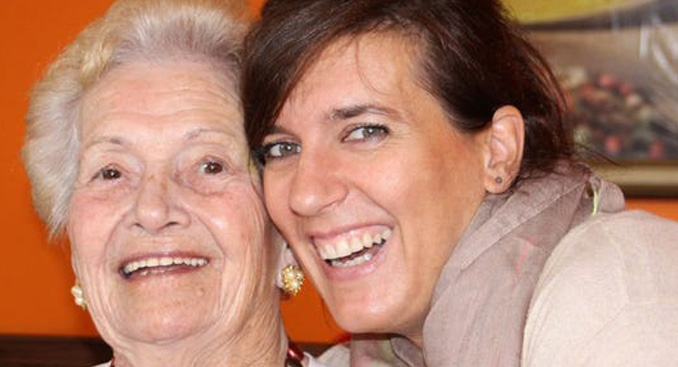7 Ways Hospice Care Helps Families

Family means everything to the Garners.
Bill and Evonnia Garner lived on a quiet cul-de-sac in Carthage, Ohio, surrounded by the homes of most of their seven children and extended family.
Members of the Garner family have always taken care of each other. However, when son Bill Jr., and eventually Bill and Evonnia themselves, became terminally ill, the siblings found that caring for them became overwhelming. Hospice of Cincinnati (HOC), a service of the Bethesda Foundation and TriHealth, provided support so the family could do what was most important to all of them – keep their loved ones at home through the end of their lives.
The Garners are just one example of how hospice care benefits the family as much as the patient. That’s because hospice is not a “place” – it’s a philosophy of care that focuses on the entire family.
Here are just a few of the benefits to families when their loved one chooses hospice care:
1. Care support
Caring for people who are at life’s end is challenging, yet something that most of us would gladly do for our loved ones. For most HOC patients (90 percent), that care is provided at home, or in the place the patient lives. Most of us want to die at home, and that means family members are the primary caregivers. HOC’s care team visits the patient in the home on a routine basis to assess, monitor and treat symptoms, and they train the family and loved ones how to care for the patient when medical personnel aren’t around. When care is provided in a nursing home, the hospice team provides care in addition to the care the patient receives from nursing home personnel. In addition, we have a team of nurses available 24 hours a day, seven days a week by phone or in person to answer caregivers’ questions and concerns, provide support, and respond to emergencies.
2. The backing of an expert team
In addition to our nurses, other trained professionals, including physicians, social workers, chaplains and our personal care specialists, as well as our highly trained volunteers, are there to support the entire family. The team works with family members to meet their physical, emotional, social and spiritual needs, as well as the patient’s, in order to improve the quality of life for the entire family.
3. Respite care
Caregiving is mentally and physically exhausting. Patients may stay in one of our four conveniently located Inpatient Care Centers for up to five days at a time to give caregivers a much-needed break.
Linda Hickey, whose mother, Ruth, was a hospice patient, appreciated having a respite-care option. "My sisters and I had split up the responsibilities, but at times, it still felt overwhelming. Caring for her full time was exhausting," she explained. HOC cared for Ruth as a respite care patient at the Hamilton Inpatient Care Center, giving the family time to recharge.
4. Grief support
The Goldstein Family Grief Center, and Fernside – the Center for Grieving Children, promote healing for life after loss by providing families bereavement support for 13 months after the death of their loved one, regardless of whether the patient was cared for by HOC.
HOC also helps families cope with the anticipation of losing their loved one through the guidance and support of our social workers and chaplains. “Hospice helped guide us through the emotional pain of watching a sibling die at such a young age,” said Samantha, one of the four sisters of HOC patient Nick Sakaras. “We know Nick died peacefully, and it was a loving place for all of us to be. The staff and the volunteers all loved on our family and made it bearable.”
5. Help with planning
In addition to working with the patient and family to create an individualized care plan, hospice staff can also help with advance care planning if that hasn’t already been taken care of. This includes having conversations about health care preferences, and helping to prepare Living Wills (not the same as a Last Will and Testament) and Medical Power of Attorney documents.
6. Less stress, better health
Research indicates that the spouses of hospice patients may live longer than those whose spouses did not choose end-of-life hospice support. One study found that surviving spouses whose husband or wife received hospice care had lower mortality rates 18 months after the spouse’s death, compared to older adults whose spouse had not received hospice care.1 The findings suggest that hospice care benefits not only patients but also their family members, by alleviating the suffering caused by the intense burden of caregiving.
7. Peace of mind
Hospice care provides meaningful and compassionate end-of-life care according to the patient’s own wishes. It also gives family members the chance to spend precious quality time with the patient, creating moments of joy and celebrating the life of the one they love. Many families have said that they were surprised at how much they laughed and enjoyed the months and weeks they shared together.
“Your staff made it possible for my mom to pass on exactly as she desired: at home, in her bed, surrounded by her daughters,” Jackie Glaser wrote in a letter to HOC. “They helped me and my family give my mom this gift by taking care of the details and ensuring mom was as comfortable as she could be.”
John Garner, brother to Bill Jr., added, “Their help allowed me to be his brother before he died. And that was priceless.”
If you have a loved one who might need hospice care, call us at 513 891 7700, or fill out our contact form at https://www.hospiceofcincinnati.org/contact_us.shtml.
1 Ahrens, J. The Positive Impact of Hospice Care on the Surviving Spouse. Home Healthcare Now. 23(1), 53-55.